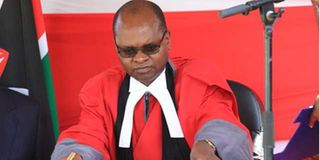
Justice Jairus Ngaah. FILE | NATION
When an overzealous police officer fired a tear gas canister at Davji Atellah, the secretary-general of the Kenya Medical Practitioners, Pharmacists and Dentists Union (KMPDU) in February 2024, he probably had no idea of the Pandora's box the move would open for his colleagues and bosses.
On December 31, 2024, the High Court ruled that the inspector-general can be held personally liable, and even prosecuted, for actions of his juniors, such as the officer who fractured Dr Atellah’s skull with a tear gas canister.
This means that the Inspector-General of Police and other senior police officers can be charged or sued for damages if their command, or lack of it, leads to injuries and death.
For trial of police bosses, it means that either the Director of Public Prosecutions can order for the process to be done, or individuals can initiate private prosecution, which could open the floodgates for several victims of brutality during recent anti-government and anti-abduction protests.
Justice Jairus Ngaah delivered the judgment on a case by nine human rights groups stemming from Dr Atellah’s injury during the month-long doctors’ strike in 2024.
Justice Ngaah may have set the stage for changes in how senior and junior police commanders handle protests, as Kenya witnesses one of the highest number of successive anti-government protests in its recent history.
Hundreds have been injured in peaceful protests since June, 2024 and the import of Justice Ngaah’s decision is that they are now free to pursue security bosses if they can prove in court that their pain was the result of police excesses.
Aside from lifting the institutional veil that police bosses have hidden behind, Justice Ngaah’s decision also implies that leaving office may not shield top brass from legal consequences.
And in drawing the consequences for police excesses, the judge’s decision follows a 2017 petition in which the High Court ruled that individual police officers can be sued in their personal capacity for extrajudicial actions.
In that case, 19 individuals and their lawyer, Stephen Nzaku, sued seven Ongata Rongai Police Station officers for arbitrary arrest.
The 19 businessmen were arrested despite committing no offence, and they called Mr Nzaku to assist them at the police station. When Mr Nzaku appeared, he was also arrested and detained overnight. They were awarded Sh6.8 million, which was to be paid by both the National Police Service and the individual officers.
Former Inspector-General Japhet Koome has become the first casualty of Justice Ngaah’s precedent setter, as the judge ordered that he dig into his own pocket and compensate Dr Atellah, who was among hundreds of doctors protesting as they sought better pay in line with signed agreements.
Mr Koome’s successors, Gilbert Masengeli and Douglas Kanja, have also had run-ins with the courts stemming from protests and abductions.
While still acting Inspector-General, Mr Masengeli was in September, 2024 found in contempt of court for failing to appear before Justice Lawrence Mugambi to explain the whereabouts of three men abducted in Kitengela.
Mr Masengeli eventually appeared before the judge and apologised before his conviction and six-month prison sentence. The three men were released by their captors.
Current Inspector-General Mr Kanja is expected to appear before Justice Bahati Mwamuye on January 27, alongside Director of Criminal Investigations Mohammed Amin, following the abduction of six men in December.
If they snub the January 27 court date, they will be convicted for contempt and sentenced.
On December 31, Justice Ngaah in his judgment told the police to uphold the rule of law and not to take away the rights of citizens as enshrined in the Constitution.
“Mr Koome had no powers to suspend the doctors’ strike in a decision he made on April 14, 2024 as he purported to suspend articles 36, 37 and 41 of the constitution by cancelling Kenya Medical Practitioners and Dentists Union (KMPDU) members’ right to strike” the judge said.










